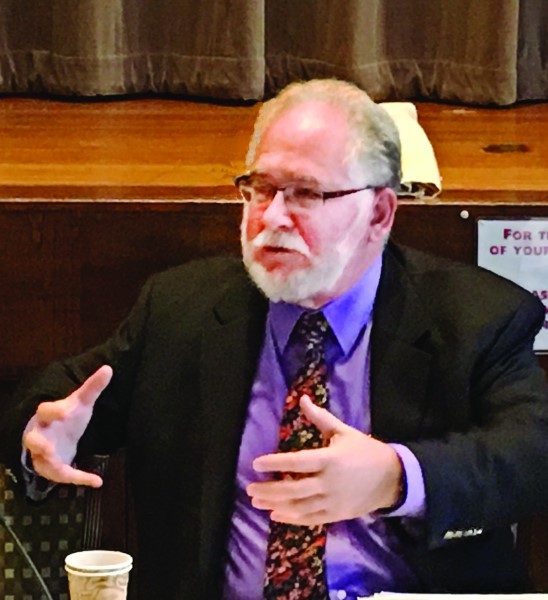Rabbi Uri Regev speaks on religious freedom and equality in Israel
Rabbi Uri Regev wants you to think about freedom of religion in ways you might not have thought about it before.
He’s an advocate for religious freedom and equality for Jews in Israel. This is not an issue that might be at the forefront of your thoughts, amid the security concerns and economic challenges faced by the Jewish state, but Regev thinks it should be. To him, this is an issue of paramount importance for the survival of Israel and its connection to Jews in the Diaspora.
“This is the way to strengthen Israel as a true democratic state,” he said. “This is the most pro-Israel stand you can take.”
Regev travels in the United States, and elsewhere, sharing his views about the importance of equality and religious freedom for Israeli Jews.
Recently, he brought his message to Temple Beth-El, in Providence, and Temple Beth El, in Fall River. In Providence, he spoke to more than two dozen community members at a breakfast on Nov. 7.
Regev insists this is not a political issue. In fact, he says it is a nonpartisan issue that reaches across denominational lines and is vital to the future of Israel and all Jews.
A native Israeli, Regev is president and founder of Hiddush, an organization that aims for “freedom of religion and conscience” as well as “full social and political equality without distinction on the basis of religion” in Israel.
The group reaches out to all sides, says Regev. Hiddush “believes that fully realizing the promise of religious freedom in Israel will strengthen the nation as a democracy and as a Jewish state and will bolster Jewish peoplehood and Israel/Diaspora relationships.”
Because Hiddush is not affiliated with any political factions, streams of Judaism or secular groups, everyone can feel equally comfortable embracing its mission, said Regev. “There is no hidden agenda. It’s about freedom of religion and equality.”
The former president of the World Union for Progressive Judaism, Regev is a rabbi, an attorney and the founder of the Israel Religious Action Center (IRAC), which works to advance civil rights in Israel.
Much of the group’s advocacy centers on marriage equality, long an issue in Israel, where only Orthodox marriages are recognized.
Regev points out that many of the Jews from the former Soviet Union who live in Israel cannot marry there because they are not recognized as Jews by the chief rabbinate, even though they may have had a Jewish mother. This also affects Reform or Conservative Jews who make aliyah.
“The majority of American Jews today may not be able to marry in Israel,” he said, adding that most Israeli Jews support freedom of marriage, a recent survey found.
At 68 years old, Israel is still debating what it should be, Regev said.
“We have this challenging vision of Israel as a Jewish and democratic state. The challenge continues as to what that means,” he said.
FRAN OSTENDORF is the editor of The Jewish Voice.








